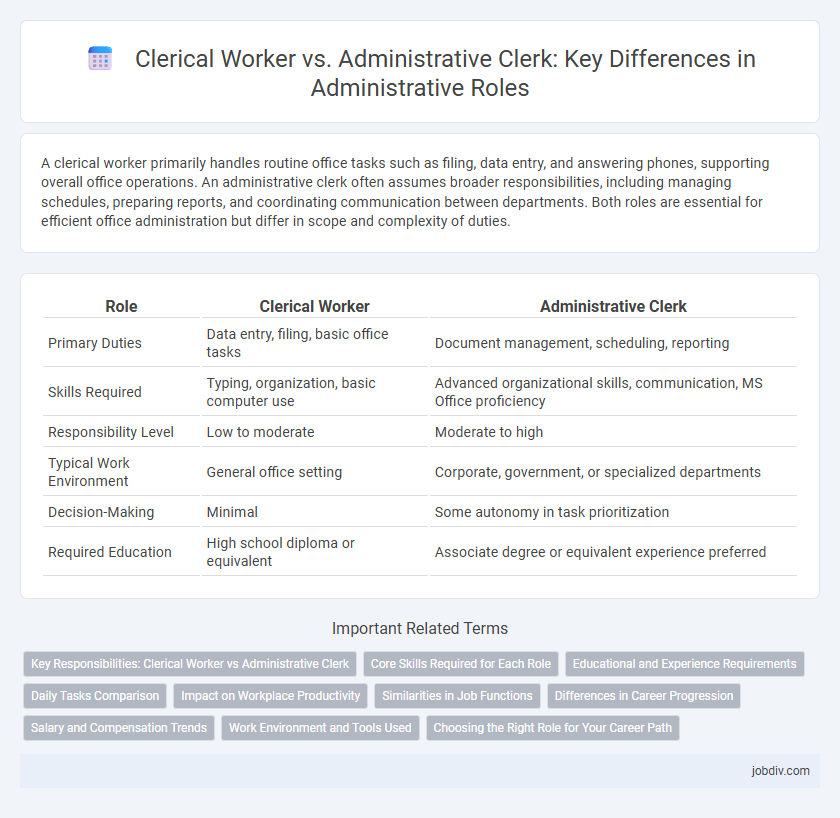A clerical worker primarily handles routine office tasks such as filing, data entry, and answering phones, supporting overall office operations. An administrative clerk often assumes broader responsibilities, including managing schedules, preparing reports, and coordinating communication between departments. Both roles are essential for efficient office administration but differ in scope and complexity of duties.
Table of Comparison
| Role | Clerical Worker | Administrative Clerk |
|---|---|---|
| Primary Duties | Data entry, filing, basic office tasks | Document management, scheduling, reporting |
| Skills Required | Typing, organization, basic computer use | Advanced organizational skills, communication, MS Office proficiency |
| Responsibility Level | Low to moderate | Moderate to high |
| Typical Work Environment | General office setting | Corporate, government, or specialized departments |
| Decision-Making | Minimal | Some autonomy in task prioritization |
| Required Education | High school diploma or equivalent | Associate degree or equivalent experience preferred |
Key Responsibilities: Clerical Worker vs Administrative Clerk
Clerical workers primarily handle basic office tasks such as data entry, filing, and managing correspondence, ensuring smooth day-to-day operations. Administrative clerks take on more specialized duties including scheduling meetings, preparing reports, and supporting management with organizational tasks. Both roles require proficiency in office software and strong communication skills to maintain efficient workflow in administrative environments.
Core Skills Required for Each Role
Clerical workers require strong data entry skills, proficiency in office software such as Microsoft Office, and excellent organizational abilities to manage files and correspondence efficiently. Administrative clerks need superior communication skills, knowledge of office management procedures, and the ability to coordinate schedules and support senior staff. Both roles demand attention to detail, time management, and basic bookkeeping knowledge to ensure smooth office operations.
Educational and Experience Requirements
Clerical workers typically require a high school diploma or equivalent, with on-the-job training sufficing for most entry-level positions, while administrative clerks often need additional specialized training or postsecondary certification related to office administration. Experience requirements for clerical workers are minimal, focusing on basic data entry and record-keeping skills, whereas administrative clerks benefit from 1-3 years of experience in office management or related fields to handle more complex tasks. Proficiency in office software, attention to detail, and organizational skills are essential for both roles but emphasized more rigorously for administrative clerks.
Daily Tasks Comparison
Clerical workers primarily handle routine office duties such as data entry, filing, and managing correspondence, ensuring information is accurately documented and organized. Administrative clerks perform similar tasks but often take on additional responsibilities like scheduling appointments, preparing reports, and supporting office management functions. Both roles involve maintaining office efficiency, with administrative clerks typically engaging in more complex and varied administrative support activities.
Impact on Workplace Productivity
Clerical workers streamline data entry, file management, and communication tasks, boosting overall office efficiency and reducing operational delays. Administrative clerks handle broader responsibilities, including scheduling, record-keeping, and coordinating departmental workflow, which significantly enhances productivity by optimizing resource allocation. Both roles contribute to a well-organized work environment, but administrative clerks often impact long-term productivity through strategic task management.
Similarities in Job Functions
Clerical workers and administrative clerks both perform essential office duties such as data entry, file management, and document preparation to support organizational operations. They handle communication tasks including answering phones, scheduling appointments, and maintaining records, ensuring smooth workflow within departments. Both roles require strong attention to detail, organizational skills, and proficiency with office software to efficiently manage administrative tasks.
Differences in Career Progression
Clerical workers typically perform routine tasks such as filing, data entry, and handling correspondence, whereas administrative clerks often take on more complex responsibilities including managing schedules and coordinating office operations. Career progression for clerical workers usually leads to specialized administrative roles or supervisory positions within specific departments, while administrative clerks have opportunities to advance into administrative assistant roles or office management due to their broader skill set. The scope of tasks and required competencies largely influence the trajectory and promotion pathways within administrative career tracks.
Salary and Compensation Trends
Clerical workers and administrative clerks experience varied salary trends influenced by industry and geographic location, with administrative clerks often receiving higher average compensation due to expanded responsibilities and required skill sets. According to recent labor statistics, the median annual wage for administrative clerks typically exceeds that of clerical workers by approximately 10-15%, reflecting differences in job complexity and organizational roles. Employers increasingly offer competitive benefits and performance bonuses to both positions, responding to labor market demands and the evolving scope of administrative support functions.
Work Environment and Tools Used
Clerical workers typically operate in office environments equipped with standard tools such as computers, printers, and telephone systems to manage routine administrative tasks. Administrative clerks often work within more structured settings, utilizing specialized software for data entry, record keeping, and office coordination. Both roles demand proficiency in office equipment and communication technologies to efficiently support organizational operations.
Choosing the Right Role for Your Career Path
Clerical workers handle routine data entry, filing, and basic office tasks, making them ideal for those seeking entry-level positions with straightforward responsibilities. Administrative clerks have broader duties including managing schedules, preparing reports, and supporting departmental functions, suited for individuals aiming to develop organizational and multitasking skills. Understanding the scope and skill requirements of each role helps align your career path with job expectations and growth opportunities.
Clerical Worker vs Administrative Clerk Infographic

 jobdiv.com
jobdiv.com